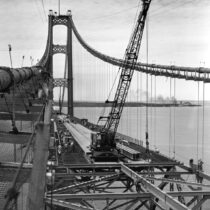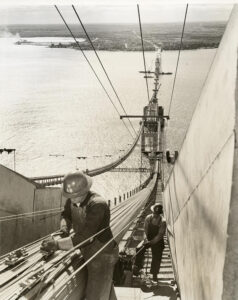Magazine

Bridge the Gap
By Robert Havey
The plan to build a bridge across the Straits of Mackinac began in earnest in the 1880s. Northern Michigan’s population was exploding, and the ferries that brought people and goods between Michigan’s two peninsulas were crowded and increasingly inadequate. The dedication of the Brooklyn Bridge in 1883 proved that a suspension bridge of such a large size was possible.
More than 70 years later, the Mackinac Bridge was completed.
What happened in the meantime? A collapse of the U.S. economy in 1893, a World War, a more devastating collapse of the U.S. economy during the Great Depression, and another, even larger World War.
Construction on the Mackinac Bridge finally began in 1954. When it was completed in 1957, its 3,800-foot span was the second-longest in the world, just behind the Golden Gate Bridge. But, as the members of the Mackinac Bridge Authority were quick to point out, if you measure between anchorages (where the bridges are secured to land) instead of the distance between the main towers, the Mackinac Bridge was, in fact, the longest.

Construction on the Mackinac Bridge began in May 1954. The Paul Bunyan Bridge Builders adjust cable wire in this image from the William Ratigan collection.
